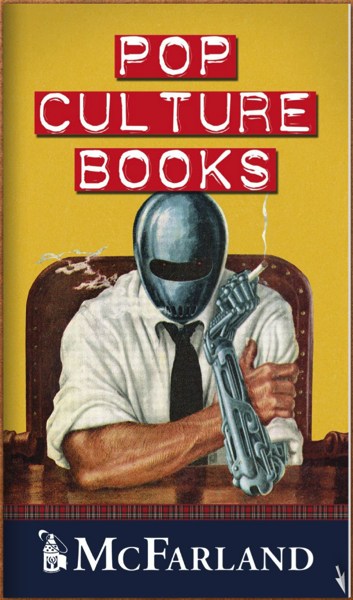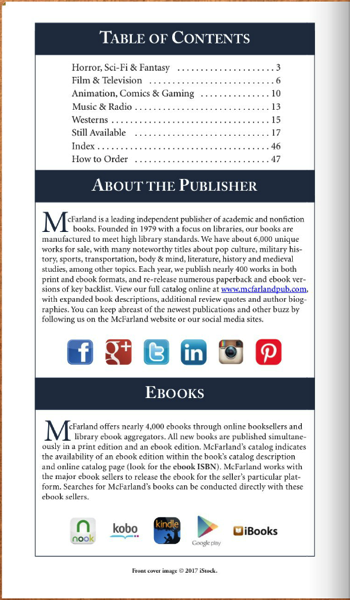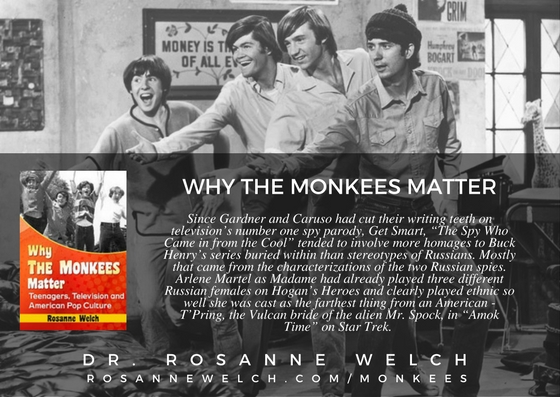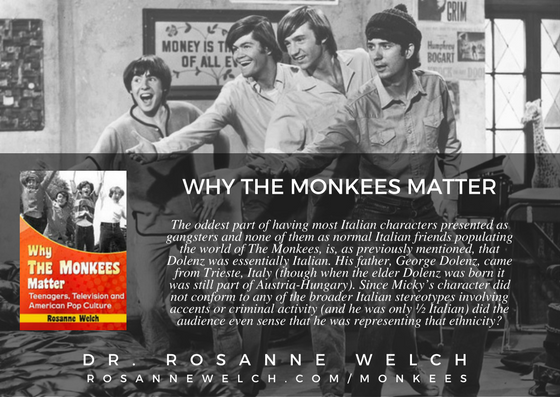If you enjoyed “Why The Monkees Matter” you can find even more interesting titles by my publisher in McFarland’s 2017 Pop Culture Books Catalog.
Category: Writing
Quotes from “Why The Monkees Matter” by Dr. Rosanne Welch – 46 in a series – The Spy Who Came In From The Cool
** Buy “Why The Monkees Matter” Today **
Since Gardner and Caruso had cut their writing teeth on television’s number one spy parody, Get Smart, “The Spy Who Came in from the Cool” tended to involve more homages to Buck Henry’s series buried within than stereotypes of Russians. Mostly that came from the characterizations of the two Russian spies. Arlene Martel as Madame had already played three different Russian females on Hogan’s Heroes and clearly played ethnic so well she was cast as the farthest thing from an American – T’Pring, the Vulcan bride of the alien Mr. Spock, in “Amok Time” on Star Trek.
from Why The Monkees Mattered by Dr. Rosanne Welch — Buy your Copy today!
Why The Monkees Matter: Teenagers, Television and American Pop Culture
McFarland (Direct from Publisher) | Amazon | Kindle Edition | Nook Edition
More on Adapting Argo from A History of the Art of Adaptation [Video] (0:37)
You Can Please Some of the People Some of the Time… None of the People All of the Time: A History of the Art of Adaptation in Movies like Dune, The Godfather, Harry Potter and More!
Dr. Rosanne Welch speaks on A History of the Art of Adaptation in Movies like Dune, The Godfather, Harry Potter and More! at the California State University, Fullerton Library
Part of the program series for Dune by Frank Herbert: A 50th Anniversary Celebration.
Watch this entire presentation
Transcript:
So that was one change and that change happens all the time in movies and that’s regrettable because people need to be represented. We need to understand that we’re in a multi-cultural, diverse, country and every time we take a character that has some ethnic background — I mean imagine Vito Corelone — actually, when they went to make The Godfather, one of the people up for playing Michael Corelone was Robert Redford. As an Italian? How was that going to work? Right? But he was a big name. He was young. Whatever. So. that was one change that Affleck was forced to make or the movie wouldn’t have been made at all, which I think is interesting. He thought the story was worth getting out there.
About this talk
Dr. Rosanne Welch (RTVF) speaks on the craft of history of film adaptations from the controversy of the silent film Birth of a Nation (protested by the National Association for the Advancement of Colored People in 1915) to Breakfast at Tiffany’s (to which author Truman Capote famously said, “The only thing left from the book is the title”) to The Godfather . Naturally, the behemoth in adaptation – Harry Potter (which depended on the relationship created by adapter Steve Kloves and author J.K. Rowling) will be discussed, as will the subject of this month’s celebration: Dune.
Date: Wednesday, October 14, 2015 Time: 1:00pm – 2:00pm
About Dr. Rosanne Welch
Dr. Rosanne Welch is a professor in the Low Residency MFA in Screenwriting Program from Stephens College, California State University, Fullerton, Mount San Antonio Community College and Cal Poly Pomona. In 2007, she graduated with her Ph.D. in 20th Century U.S./Film History from Claremont Graduate University. She graduated with her M.A. in 20th Century United States History from California State University, Northridge in 2004.
Welch is also a television writer/producer with credits for Beverly Hills 90210 , CBS’s Emmy winning Picket Fences and Touched By An Angel . She also writes and hosts her own podcasts on 3rdPass.media, her first one titled “Mindful(I) Media with Dr. Rosanne Welch.”
Her upcoming book, “Why The Monkees Matter: Teenagers, Television and American Pop Culture” will be published in Fall 2016
Three Ring Circus: How Real Couples Balance Marriage, Work and Kids and The Encyclopedia of Women in Aviation and Space are two books she has written. Los Angeles Times and the Journal of Screenwriting hold some of her published articles.
Dr. Rosanne Welch Web Site and Blog
Podcast: Play in new window | Download
Subscribe: RSS
Quotes from “Why The Monkees Matter” by Dr. Rosanne Welch – 45 in a series – Native American Portrayals
** Buy “Why The Monkees Matter” Today **
Perhaps due to the attention drawn by the Red Power Movement during the run of The Monkees, Native Americans tended to fare better than Americans of Asian descent. Perhaps the fact that Dolenz self-identified as part Native American on his mother’s side had an effect. Perhaps the writers were looking to move beyond the Tonto/Lone Ranger dynamic. Or perhaps the writers and actors found a connection between Native Americans and the emerging ideology of the hippie movement.
from Why The Monkees Mattered by Dr. Rosanne Welch — Buy your Copy today!
Why The Monkees Matter: Teenagers, Television and American Pop Culture
McFarland (Direct from Publisher) | Amazon | Kindle Edition | Nook Edition
Adapting Argo from A History of the Art of Adaptation [Video] (1:06)
You Can Please Some of the People Some of the Time… None of the People All of the Time: A History of the Art of Adaptation in Movies like Dune, The Godfather, Harry Potter and More!
Dr. Rosanne Welch speaks on A History of the Art of Adaptation in Movies like Dune, The Godfather, Harry Potter and More! at the California State University, Fullerton Library
Part of the program series for Dune by Frank Herbert: A 50th Anniversary Celebration.
Watch this entire presentation
Transcript:
Argo which, of course, won the Oscar just a couple of years ago is an example of some changes that were made that are regrettable and yet the movie holds up and it’s not Ben Affleck’s fault. When Ben Affleck went to make the movie, which won an Oscar for him, he knew that in the story, which is a true story, the actual CIA gentleman is named Tony Mendez. Tony Mendez and Affleck doesn’t look like a Tony Mendez. He wanted a Latino actor to be the lead in the film. he looked for someone that the studio would approve. The only Latino actor one considers to open a movie is Antonio Banderas and he’s booked, booked, booked. Because he’s the only Latino actor who can open a movie. So, the studio said to Affleck, “Look, why don’t you play the part?”
“But I’m not Latino. It’s going to erase the ethnic feeling of this movie.”
And they said, Ok, then we just won’t make the movie.”
He said, “Ok, as long as we keep the guy’s name. Maybe people will realize” and of course, if they look at the book they will understand that we’re talking about a Hispanic actor.
About this talk
Dr. Rosanne Welch (RTVF) speaks on the craft of history of film adaptations from the controversy of the silent film Birth of a Nation (protested by the National Association for the Advancement of Colored People in 1915) to Breakfast at Tiffany’s (to which author Truman Capote famously said, “The only thing left from the book is the title”) to The Godfather . Naturally, the behemoth in adaptation – Harry Potter (which depended on the relationship created by adapter Steve Kloves and author J.K. Rowling) will be discussed, as will the subject of this month’s celebration: Dune.
Date: Wednesday, October 14, 2015 Time: 1:00pm – 2:00pm
About Dr. Rosanne Welch
Dr. Rosanne Welch is a professor in the Low Residency MFA in Screenwriting Program from Stephens College, California State University, Fullerton, Mount San Antonio Community College and Cal Poly Pomona. In 2007, she graduated with her Ph.D. in 20th Century U.S./Film History from Claremont Graduate University. She graduated with her M.A. in 20th Century United States History from California State University, Northridge in 2004.
Welch is also a television writer/producer with credits for Beverly Hills 90210 , CBS’s Emmy winning Picket Fences and Touched By An Angel . She also writes and hosts her own podcasts on 3rdPass.media, her first one titled “Mindful(I) Media with Dr. Rosanne Welch.”
Her upcoming book, “Why The Monkees Matter: Teenagers, Television and American Pop Culture” will be published in Fall 2016
Three Ring Circus: How Real Couples Balance Marriage, Work and Kids and The Encyclopedia of Women in Aviation and Space are two books she has written. Los Angeles Times and the Journal of Screenwriting hold some of her published articles.
Dr. Rosanne Welch Web Site and Blog
Podcast: Play in new window | Download
Subscribe: RSS
Quotes from “Why The Monkees Matter” by Dr. Rosanne Welch – 44 in a series – Asian Portrayals
** Buy “Why The Monkees Matter” Today **
The only positive representation of Asian culture came unexpectedly in the final episode, “Frodis Caper”, co-written by Dolenz and Dave Evans. As discussed in the chapter on counter-culture, a Buddhist chant known as the Lotus Sutra aided the band in escaping the evil Wizard Glick and saving the world. Therefore these all-American boys save the world with the help of Nam-myoho-renge-kyo, a teaching from the first historical Budda, Siddhartha Gautama.
from Why The Monkees Mattered by Dr. Rosanne Welch — Buy your Copy today!
Why The Monkees Matter: Teenagers, Television and American Pop Culture
McFarland (Direct from Publisher) | Amazon | Kindle Edition | Nook Edition
Adapting Sense and Sensibility from A History of the Art of Adaptation [Video] (1:10)
You Can Please Some of the People Some of the Time… None of the People All of the Time: A History of the Art of Adaptation in Movies like Dune, The Godfather, Harry Potter and More!
Dr. Rosanne Welch speaks on A History of the Art of Adaptation in Movies like Dune, The Godfather, Harry Potter and More! at the California State University, Fullerton Library
Part of the program series for Dune by Frank Herbert: A 50th Anniversary Celebration.
Watch this entire presentation
Transcript:
We all know that recently there’s been a whole run of Jane Austen. Suddenly the whole world loves Jane Austen again, which is fun. Recently — well not that recently — Sense and Sensibility ws turned into a movies. Hugely Successful. The best of this particular story ever. It was written by Emma Thompson, who some people forget is also a writer, not just an actress. She was hired because they wanted a writer who would retain the humor on Jane Austen. Many people don’t think she has humor. And in fact she does. So, Emma Thompson was a famous comedian at the time. It was long before she did any work in America with Kenneth Branaugh, so she was just know as a comedian in England. She took on the job — it took them about 5-6 years to get it made. What’s really interesting is that she kept a diary of the process of adapting it and the process of filming the adaptation, wherein continued changes were made on a daily basis on the set. So she documents changes — why they were made — who asked for them — whether she agreed of not — how that discussion took place. It’s a really excellent look at the full process of adapting something and it became quite a financial success. So, it was a pretty big adaption to note.
About this talk
Dr. Rosanne Welch (RTVF) speaks on the craft of history of film adaptations from the controversy of the silent film Birth of a Nation (protested by the National Association for the Advancement of Colored People in 1915) to Breakfast at Tiffany’s (to which author Truman Capote famously said, “The only thing left from the book is the title”) to The Godfather . Naturally, the behemoth in adaptation – Harry Potter (which depended on the relationship created by adapter Steve Kloves and author J.K. Rowling) will be discussed, as will the subject of this month’s celebration: Dune.
Date: Wednesday, October 14, 2015 Time: 1:00pm – 2:00pm
About Dr. Rosanne Welch
Dr. Rosanne Welch is a professor in the Low Residency MFA in Screenwriting Program from Stephens College, California State University, Fullerton, Mount San Antonio Community College and Cal Poly Pomona. In 2007, she graduated with her Ph.D. in 20th Century U.S./Film History from Claremont Graduate University. She graduated with her M.A. in 20th Century United States History from California State University, Northridge in 2004.
Welch is also a television writer/producer with credits for Beverly Hills 90210 , CBS’s Emmy winning Picket Fences and Touched By An Angel . She also writes and hosts her own podcasts on 3rdPass.media, her first one titled “Mindful(I) Media with Dr. Rosanne Welch.”
Her upcoming book, “Why The Monkees Matter: Teenagers, Television and American Pop Culture” will be published in Fall 2016
Three Ring Circus: How Real Couples Balance Marriage, Work and Kids and The Encyclopedia of Women in Aviation and Space are two books she has written. Los Angeles Times and the Journal of Screenwriting hold some of her published articles.
Dr. Rosanne Welch Web Site and Blog
Podcast: Play in new window | Download
Subscribe: RSS
Quotes from “Why The Monkees Matter” by Dr. Rosanne Welch – 43 in a series – Italians
** Buy “Why The Monkees Matter” Today **
The oddest part of having most Italian characters presented as gangsters and none of them as normal Italian friends populating the world of The Monkees, is, as previously mentioned, that Dolenz was essentially Italian. His father, George Dolenz, came from Trieste, Italy (though when the elder Dolenz was born it was still part of Austria-Hungary). Since Micky’s character did not conform to any of the broader Italian stereotypes involving accents or criminal activity (and he was only ½ Italian) did the audience even sense that he was representing that ethnicity?
from Why The Monkees Mattered by Dr. Rosanne Welch — Buy your Copy today!
Why The Monkees Matter: Teenagers, Television and American Pop Culture
McFarland (Direct from Publisher) | Amazon | Kindle Edition | Nook Edition
Final Thoughts On Adapting The Prince of Tides from A History of the Art of Adaptation [Video] (0:40)
You Can Please Some of the People Some of the Time… None of the People All of the Time: A History of the Art of Adaptation in Movies like Dune, The Godfather, Harry Potter and More!
Dr. Rosanne Welch speaks on A History of the Art of Adaptation in Movies like Dune, The Godfather, Harry Potter and More! at the California State University, Fullerton Library
Part of the program series for Dune by Frank Herbert: A 50th Anniversary Celebration.
Watch this entire presentation
Transcript:
I think it’s a really good movie — I mean it got an Oscar nomination. I just don’t think in this case you want to know about the book. Now, I read the book afterwards and because I was so interested in the Tom Wingo character, I was bored with the Luke character. That didn’t work for me and I thought, Oh, I wish I had read it first so I could have made that comparison, but an interesting look at how big a change you can make and still, essentially, create a successful storyline having to do with major characters who were invented. So that was a huge controversy.
About this talk
Dr. Rosanne Welch (RTVF) speaks on the craft of history of film adaptations from the controversy of the silent film Birth of a Nation (protested by the National Association for the Advancement of Colored People in 1915) to Breakfast at Tiffany’s (to which author Truman Capote famously said, “The only thing left from the book is the title”) to The Godfather . Naturally, the behemoth in adaptation – Harry Potter (which depended on the relationship created by adapter Steve Kloves and author J.K. Rowling) will be discussed, as will the subject of this month’s celebration: Dune.
Date: Wednesday, October 14, 2015 Time: 1:00pm – 2:00pm
About Dr. Rosanne Welch
Dr. Rosanne Welch is a professor in the Low Residency MFA in Screenwriting Program from Stephens College, California State University, Fullerton, Mount San Antonio Community College and Cal Poly Pomona. In 2007, she graduated with her Ph.D. in 20th Century U.S./Film History from Claremont Graduate University. She graduated with her M.A. in 20th Century United States History from California State University, Northridge in 2004.
Welch is also a television writer/producer with credits for Beverly Hills 90210 , CBS’s Emmy winning Picket Fences and Touched By An Angel . She also writes and hosts her own podcasts on 3rdPass.media, her first one titled “Mindful(I) Media with Dr. Rosanne Welch.”
Her upcoming book, “Why The Monkees Matter: Teenagers, Television and American Pop Culture” will be published in Fall 2016
Three Ring Circus: How Real Couples Balance Marriage, Work and Kids and The Encyclopedia of Women in Aviation and Space are two books she has written. Los Angeles Times and the Journal of Screenwriting hold some of her published articles.
Dr. Rosanne Welch Web Site and Blog
Podcast: Play in new window | Download
Subscribe: RSS
From the Index… The Y’s & Z’s – “Why The Monkees Matter” – END
Wonder what and who I mentioned in “Why The Monkees Matter”? Check out these index entries!
Yankovic, Weird Al 151
“You and I” 148
“You Just May Be The One” 59
Young, Neil 148
Young and the Restless, The 17
Young Frankenstein 113
“Your Friendly Neighborhood Kidnappers” 70, 72, 94, 116
YouTube 36, 106
Zappa, Frank 20, 37, 50, 99, 139, 152
Zimbalist Jr, Efrem 15-16
Zinn, Howard 39
Zombie, Rob 129, 152, 155
“Zor and Zam” 34
Why The Monkees Matter: Teenagers, Television and American Pop Culture
McFarland (Direct from Publisher) | Amazon | Kindle Edition | Nook Edition





![More on Adapting Argo from A History of the Art of Adaptation [Video] (0:37)](https://rosannewelch.com/wp-content/uploads/2017/02/adapt-35-argo-2.jpeg)

![Adapting Argo from A History of the Art of Adaptation [Video] (1:06)](https://rosannewelch.com/wp-content/uploads/2017/01/adapt-34-argo.jpeg)

![Adapting Sense and Sensibility from A History of the Art of Adaptation [Video] (1:10)](https://rosannewelch.com/wp-content/uploads/2017/01/adapt-33-sense-sensibility.jpeg)

![Final Thoughts On Adapting The Prince of Tides from A History of the Art of Adaptation [Video] (0:40)](https://rosannewelch.com/wp-content/uploads/2017/01/adapt-32-prince-of-tides-3.jpeg)